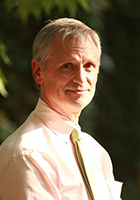 |
Earl Blumenauer
Earl Blumenauer is the U.S. Representative for Oregon's 3rd congressional district, serving since 1996. Mr. Blumenauer has created a unique role as Congress’ chief spokesperson for Livable Communities: places where people are safe, healthy and economically secure. From 1996 to 2007, he served on the Transportation and Infrastructure Committee, where he was a strong advocate for federal policies that address transportation alternatives, provide housing choices, support sustainable economies and improve the environment. He was a member of the Foreign Affairs Committee from 2001 to 2007, and vice-chair of the Select Committee on Energy Independence and Global Warming from 2007 to 2010. He is currently a member of the Budget Committee and Ways and Means Committee and the subcommittees on Health and Trade.
|
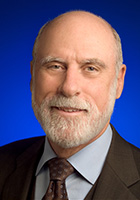 |
Vinton G. Cerf
Vinton G. Cerf is vice president and chief Internet evangelist for Google. Widely known as one of the "Fathers of the Internet," Cerf is the co-designer of the TCP/IP protocols and the architecture of the Internet. With his colleague, Robert Kahn, Cerf received the U.S. National Medal of Technology in 1997 for co-founding and developing the Internet. Kahn and Cerf have been honored as Marconi Fellows, received the ACM Alan M. Turing award, and received the Presidential Medal of Freedom.
Cerf served as chairman of the board of the Internet Corporation for Assigned Names and Numbers (ICANN) from 2000-2007 and as founding president of the Internet Society. He is a Fellow of the IEEE, ACM, and American Association for the Advancement of Science, the American Academy of Arts and Sciences, the American Philosophical Society, the International Engineering Consortium, the Computer History Museum and a member of the National Academy of Engineering. He holds a Bachelor of Science degree in Mathematics from Stanford University and Master of Science and Ph.D. degrees in Computer Science from UCLA. He also holds honorary Doctorate degrees from 20 universities.
|
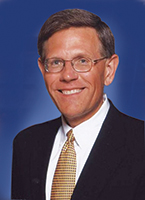 |
Kelvin K. Droegemeier
Kelvin K. Droegemeier earned a B.S. with Special Distinction in Meteorology in 1980 from the University of Oklahoma, and M.S. and Ph.D. degrees in atmospheric science in 1982 and 1985, respectively, from the University of Illinois at Urbana-Champaign. He joined the University of Oklahoma in September, 1985 as an Assistant Professor of Meteorology, and was tenured and promoted to Associate Professor in July, 1991, and promoted to Professor in July, 1998. Dr. Droegemeier was co-founder in 1989 of the NSF Science and Technology Center (STC) for Analysis and Prediction of Storms (CAPS), and served for five years as its deputy director. He then directed CAPS from 1994 until 2006, and today CAPS is recognized around the world as the pioneer of storm-scale numerical weather prediction. In 2003, Dr. Droegemeier co-founded the NSF Engineering Research Center for Collaborative Adaptive Sensing of the Atmosphere (CASA) and served for several years as its deputy director. From 1999-2001, he wrote a daily weather science column for the Daily Oklahoman newspaper, which is Oklahoma's largest.
|
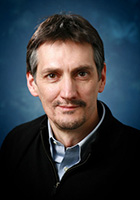 |
Wilford Robert Pinfold
Wilfred Pinfold is a computer industry executive. In his 20 years at Intel he has held positions in application development, marketing, program management and general management. He is currently Director of Research and Advanced Technology Development in Intel Federal. He has a PhD in Computational Fluid Dynamics and Studied Business at Stanford.
|
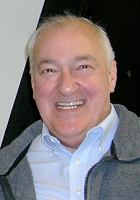 |
Roy Sampsel
Roy Sampsel, Choctaw and Wyandotte Tribes, is a Board Member of the Institute for Tribal Government, the Tribal Leadership Forum, and also president of Global Resources Inc., a natural resources and management consulting firm located in Portland, Oregon. Mr. Sampsel received his B.A. in Political Science from Portland State University. From 1981-1983 he served as the Deputy Assistant Secretary for Indian Affairs for the US Department of the Interior in Washington, D.C., where he worked on Indian rights protection and natural resources policy (including timber, fish, wildlife, oil, gas and minerals). Mr. Sampsel also worked for the Bureau of Indian Affairs on implementation of the Indian Self-Determination and Education Act. From 1977-79 he served as the first Executive Director of the Columbia River Inter-Tribal Fish Commission (Portland, Oregon), an inter-tribal agency created to protect treaty fishing rights of the Warm Springs, Yakama, Umatilla and Nez Perce Tribes.
|
|
|
|
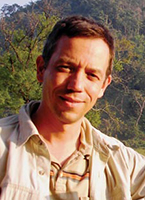 |
William Vesneski
William Vesneski is the Director of Evaluation and Planning at the Paul G. Allen Family Foundation where he manages the Foundation's grant monitoring systems and reports on grant outcomes to the Board of Directors. He is also responsible for the Foundation's financial empowerment portfolio. For nearly 15 years, Bill has held evaluation positions with local, regional and national nonprofits and philanthropies. His clients included the National Court Appointed Special Advocate (CASA) Association, Zero to Three, and the Oregon Department of Health. Previously, he spent nearly a decade as a public defender in juvenile and family court. Along with a law degree from Seattle University, Bill holds an MSW and PhD in social work from the University of Washington.
|
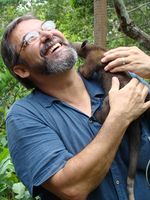 |
Jon Waterhouse
When Jon Waterhouse was asked by the Tribal leaders of the Yukon River Watershed concerned for their water, to 'go out and take the pulse of the river', he quickly saw their request as not only an opportunity to inspire environmental stewardship, but a means to connect cultures the world over through the science of water health. Jon began that effort, which he christened 'the Healing Journey', by canoeing down the Yukon, recording the oral histories shared by generations of indigenous inhabitants living along its banks, collecting water quality data from the entire length of the river, and sending those samples to the USGS lab in Denver in real time.
Today, the Healing Journey has spawned another endeavor, a global initiative known as the Network of Indigenous Knowledge - or NIK. NIK is reaching from the Yukon to the Amazon, the Lena, the Mackenzie, the Danube and the White Nile for starters, as Jon presses environmental stewardship and citizen science ever forward. Under Jon's direction, the Yukon River Inter-tribal Watershed Council has created what is considered to be the largest indigenous river monitoring network in the world.
Jon is a National Geographic Education Fellow and Explorer. He serves on the Board of the Alaska/Sudan Medical Project. In 2010 he was appointed by President Barack Obama to the 15-member Joint Public Advisory Committee. He serves on the Advisory Board of the Arctic Alliance and is a 2012 Eco-Trust Indigenous Leadership Awardee.
|


 The Center for Coastal Margin Observation & Prediction (CMOP) is a National Science Foundation Science and Technology Center (NSF STC) hosted at Oregon Health & Science University in partnership with Oregon State University and University of Washington. CMOP is the only NSF STC ever focused on coastal margins, and the only one ever headquartered in Oregon.
The Center for Coastal Margin Observation & Prediction (CMOP) is a National Science Foundation Science and Technology Center (NSF STC) hosted at Oregon Health & Science University in partnership with Oregon State University and University of Washington. CMOP is the only NSF STC ever focused on coastal margins, and the only one ever headquartered in Oregon.